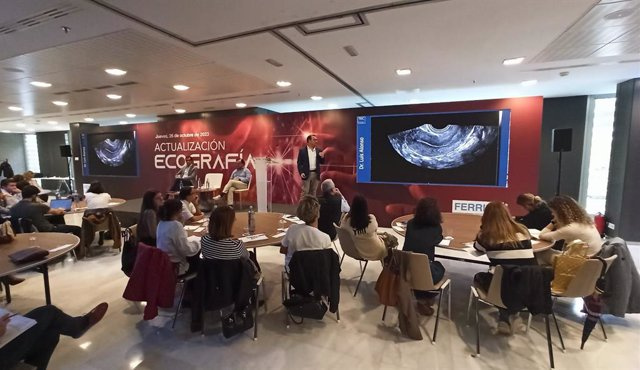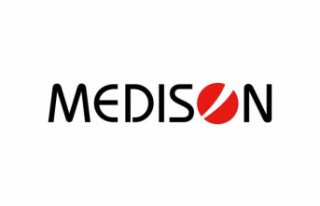(Information sent by the signatory company)
Madrid, January 8, 2024.
"Ultrasound is the main tool for the gynecologist and the first contact with pathologies that can affect reproduction" says Dr. Luis Alonso Pacheco
"Ultrasound is the main tool for the gynecologist and the first contact with pathologies that can affect reproduction" says Dr. Luis Alonso Pacheco, Coordinator of the Hysteroscopy Unit of the Hospital Quirón Salud Málaga, member of the board of directors. of the ESGE, co-president of the Global Community of Hysteroscopy, Past-president of the AAGL Hysteroscopy Group and coordinator of the Ultrasound Update Conference aimed at reproduction specialists, which was held in Madrid by Ferring with almost 100 expert Spanish gynecologists In reproduction.
It is estimated that in Spain more than 500,000 ultrasounds are performed, just in reproduction, each year; "it is the tool that gynecologists use in their daily practice. The objective of the meeting was to update in one day, all those patterns and all the criteria that are used today from the point of view of ultrasound; a "rapid update of the pathologies that can be detected and affect all assisted reproduction treatment, especially in uterine pathologies due to their influence on reproductive results."
Ultrasound is used as a diagnostic tool in gynecological pathologies and those that affect reproduction. When faced with a fertility problem, the reproduction specialist evaluates the ovarian functioning of the woman through an analysis and the adnexa and uterus with an ultrasound, which makes it a basic tool in any gynecological consultation and will check the sperm quality of the man.
"In the last ten years or so, there have been new pathologies that were not known to influence reproduction; in the last five years, new criteria and classifications have been established, but a specialist who has been practicing for fifteen years cannot be up to date. of all the advances in ultrasound, hence the importance of continued training.
Historically, advances in reproduction focused on the embryo, the laboratory or the study of the egg, signifying a very important advance for the specialty; The next step was to investigate genetics and genomics, studies of the endometrium, which allowed pregnancy rates to increase. Specialists have returned to the study of the uterus and those pathologies that can influence fertility. With ultrasound and hysteroscopy, rates and hope for women seeking pregnancy increase again.
"Ultrasound has been in practice and clinical use since 1972, currently there is no gynecology consultation that does not have an ultrasound machine," explains Dr. Rodrigo Orozco Fernández, head of the obstetrics and gynecology service at the Quirónsalud Málaga Hospital, president of the AGOM, Member of the medical-advisory Committee and the Committee for the standardization of gynecological and obstetric care Quirónsalud España, and another of the speakers.
"In Spain last year approximately 200,000 reproduction cycles were carried out and there were 400,000 births; according to the latest data from the SEF (Spanish Fertility Society) 11.8% were through assisted reproduction, which corroborates that there is something that is still unknown. It is beyond the clinic's practice to achieve that pregnancy rate that everyone wants, as close to 100% as possible, because it has a very high embryo rate, but not all of them prosper," says Dr. Rodrigo Orozco.
It is known that female gametes begin to decrease in quality from the age of thirty, with an exponential jump from the age of thirty-five; After the age of forty, it is very difficult to achieve a spontaneous pregnancy, experts report. In Spain, the average age of women to achieve their first pregnancy is 35 years.
"We must inform about the possibilities and resources today for women who wish to delay the moment of having their first child; there are treatments that can preserve oocytes at an early age, to be used later and have greater guarantees of having healthy children in the future, a series of measures that can be implemented and that are not being done today," laments the expert.
"A greater frequency of ovarian pathology is confirmed, with young people with premature ovarian failure, poor response to stimulation at an early age and uterine and pelvic pathologies, which were previously not known or were not seen as much as adenomyosis and endometriosis, which are "was associated with older women who had already had a pregnancy and now you find it in girls under 35 years old," explains Dr. Juan Luis Alcázar Zambrano, Professor and Consultant of Obstetrics and Gynecology at the Clínica Universidad de Navarra, editor of Ultrasound in Obstetrics and Gynecology and speaker of the day.
Lifestyle, endocrine disruptors, environmental or nutritional factors or daily hygiene products negatively influence the entire development of organs, systems, and our epigenetics, which could accelerate this deterioration.
Spain: world reference in assisted reproduction The research, the professionals, the good results in the treatments compared to any other country in the world, the price and the legislation make Spain a very interesting destination to have these treatments, experts agree.
According to the speakers, gynecological ultrasound has evolved a lot in recent years, both technologically, because much more prepared equipment is available, and in terms of image interpretation. Together with major scientific studies, they allow us to increasingly understand the main causes of infertility or subfertility in the population; Its use in an appropriate way and form will probably help reduce the fertility problem in the country.
The Ultrasound Update day had the collaboration of Ferring, firmly committed to continuing education and fertility.
Contact Contact name: Borja Fuente Contact description: Regional News Agency IberoPress / Tecnobitt Contact phone: 91 11 99 701













